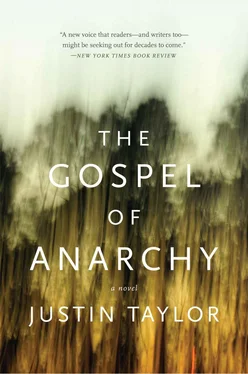In the situation of contemporaneousness, remarks Kierkegaard, signs and wonders are an exasperatingly impertinent thing. And this, Katy reasons — check that: believes —tells them not merely why so few miracles are visited upon the world, but also why some, sometimes, still are.
When the expectation is absence, what could be more impertinent than appearance?
So God has seen fit to grant them a vision, okay. Why not? Their hearts and souls are open, uniquely primed, and truly, what would make less “sense”—more perfectly evidence and manifest God’s sublime impertinence, His perfect refusal of perfection, His holy rebel-king spirit — than this? Bunch of drunkpunks in the armpit of Florida, the self-declared children of two traditions that both refuse parentage. Heretics, nobody will have them; nobody will believe in them — yet — but Him. They are His and He is theirs and there for them. The strength of the absurd.
And of course there are problems already. Errors, shortcomings, flaws, limits, gaps. Inconsistencies and contradictions unresolved and perhaps beyond resolution.
Given the opportunity, Flannery O’Connor might have described Parker as a comp lit grad student gone wrong. And Katy, holy shit — where to start? She’s this like Ren-fair refugee turned New Age sexaholic gone all too frighteningly right. A lot of the time, he seemed to be barely putting up with her (or any of them) but the fact remains that he did, and Parker was never one to suffer fools — or anything much — gladly. So there must have been some thing there, right? Something that made them real to each other — the God in each calling out to the God in the other.
Or whatever. Sometimes Liz thinks the real miracle wasn’t when Katy and Anchor dreamed of the book, but that it actually occurred much earlier, when Katy got Parker to come over to the house in the first place. It was the only time she ever tested her will against his and won.
Katy’s longing for Parker is so intense that it can seem like a put-on, a weird protracted role-play, some kind of shuck and jive. In our wink-and-nod culture, the era of the post-everything, nobody speaks like this — without irony, without cynicism, in and of universals, absolutes — unless they’re working an angle. Right? Maybe. But the fact is that for better, worse, or weirder, Liz knows, Katy’s yearning is as honest as it is fierce. Katy means what she says. She believes herself.
Privately, however, Liz thinks that Katy’s longing for their prophet is based on the deep knowledge (i.e., not faith, but the presumptive fact) that said longing will never be relieved. What Katy worships is not Parker so much as Parker’s absence, and she herself fills the space she has carved out for him, the role he perpetually declines to appear and assume. Liz doubts that Katy knows that she “knows” this. The knowledge is so fundamental that it does not register as information; it is completely integrated into Katy’s reality, not a fact of life on the ground but of the ground on which life takes place, an unknown known.
Liz’s own faith, given to wavering at the best of times, has been lately pushed to the breaking point, beyond it, in fact, which is to say: it’s broken. Their devotion is as a scourge to her. The doubt she so callously accused Thomas of was really her own all along, and now, finally, it has burnt her up from the inside out. She’s a soul-scorched shell.
And if Katy in all her glorious intuition and godliness could only see what’s right there in front of her face, she would confront Liz, call her betrayer, denounce her once and for all. But Katy doesn’t do that, because she has no discerning vision. She is a believer, period; eternal optimist, half blind. She can’t see Liz for what Liz is — deceiver; pathetic — which is, finally, the failing that Liz cannot forgive her lover for, or bear another instant. Katy’s failure to see the worst in her registers as a failure to see her at all.
So here’s Liz loading up a blue duffel till it’s full with clothes and books — all her stuff, what little she has. A few caseless CDs; she wraps looseleaf pages over them for protection, double-folds the corners down. Her one pair of sneakers (she’s wearing the boots) tied together by their laces and hung from the duffel strap. Now she’s struggling to get the zipper shut. A stitch pops but no seam bursts, thankfully. Okay. It’s going to hold.
Katy’s on the edge of the bed, beet-faced. David’s somewhere behind her, fidgeting, unsure of what to do or say — if anything. He wishes he could be invisible, here but not here. He knows that he should just get up and walk out, leave the room. This thing is older than him; he is a small, late epoch in their long, rich history. He should give them their moment.
Should, but can’t. Who, granted witness, could possibly turn his back on the end of history?
Liz keeps herself strong by going over a mental list of every single bit of shit she’s ever put up with for Katy’s sake: every false assurance given or accepted, every smile faked and male partner welcomed into bed, all in the service of what? A larger and — she thought — transcendent truth: her love for Katy, their love for each other. Is that love really gone now, sacrificed on the altar of Parker? Or has it merely warped into its inverse — this aching rage she feels?
Thomas had the right idea all along. Liz should have left when he did, a month ago, as soon as the book was unearthed. Liz sees now how it was Thomas alone who saw Katy for what she is — pseudo-revolutionary, wannabe Brigham Young. And beneath it all? Just another fucking college dropout dabbling in the sweaty pleasures of the underclass. Barely distinct, in the end, from the men she brings home.
But of course it’s not Katy she hates. Not really. Her true fury is — as always, poor girl — aimed inward, directed at herself for having reached her limit. Because why can’t she keep up appearances like usual? Why can’t she smile wide like before, say the words? Katy wants to pray to a tent — fine. Parker, servant of God — they’ve been saying that for a year now, give or take. So what’s the difference whether or not they’re kidding? And though nearly as faithless as Thomas, Liz sees the purpose, even finds joy and comfort, in the ritual and romance of religion. If anything, she’d prefer more structure and custom, perhaps even — God save us — a Law or two; just little ones. Something to learn by heart and follow. Because for her, sharing Katy’s connection to God is not about God, it’s about Katy. The body of ritual — practice and language and gesture — is a vessel, a form, to be filled with genuine faith at some future point, maybe, and if not then not, and that’s okay, too. Let that secret emptiness abide as a secret, shared between her and the silence.
Even God’s absence is His presence. His silence is His thunder.
There are times that she’s almost believed that. There could, or would have been, more.
But then here’s David. He’s the problem, because he really does believe. His faith is enormous and ever expanding. She’s a candle to his furnace — what’s that Dylan line? A fire in the sun. He outshines her. Not in Katy’s eyes, necessarily, but in Liz’s own. His plain and bountiful certainty in the book, the Revelation, Katy’s prophecy of Parker’s Promise to return to them; it’s all a slap in the face to her, a rebuke to her own faithlessness and the thin mask behind which she hides it, plus the constant fear that that mask will fall away, or be stripped from her. She might as well have the number of the beast emblazoned on her forehead, or MYSTERY scrawled scarlet on her thigh.
“Baby,” says Katy to Liz, who is leaving, “think a minute. Hang on .”
Читать дальше












